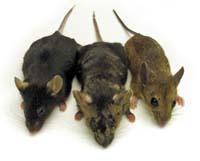Rapamycin extends the life of mice

Three US research centers, led by the ITP, which leads aging research, have concluded that the drug Rapamizine prolongs the life of mice. Rapamycin is used in medicine to prevent rejection of transplanted organs, but researchers suspected it could influence over life. Now they have seen that they were correct, as they have checked in the mouse that if they are caught with food extend their life by 9-13%.
The research was conducted in parallel in three centers. In total, 200 different mice have been analyzed genetically to ensure that the result is not related to the type of mouse. Mice have received a daily dose of rapamycin along with food. In fact, the mice wanted to start with the experiment being young, but they had problems in the preparation of the meal and in the end, when the mice were 600 days old, they started giving rapamycin. That is, if they were people like starting at about 60 years old. The result, however, has been significant, with a 13% increase in the life of females compared to mice that had not ingested drugs, compared to 9% of males.
Although no serious side effects have been detected on mice, it is still too early to think it will be useful for people. First, they want to clarify the mechanism by which rapamycin works. Some scientists believe it may be related to diet reduction, as both act on the same cellular path, but have not yet confirmed it.





